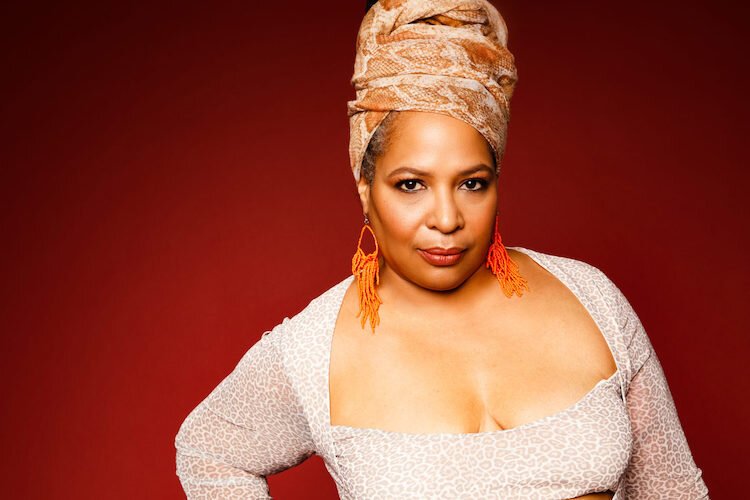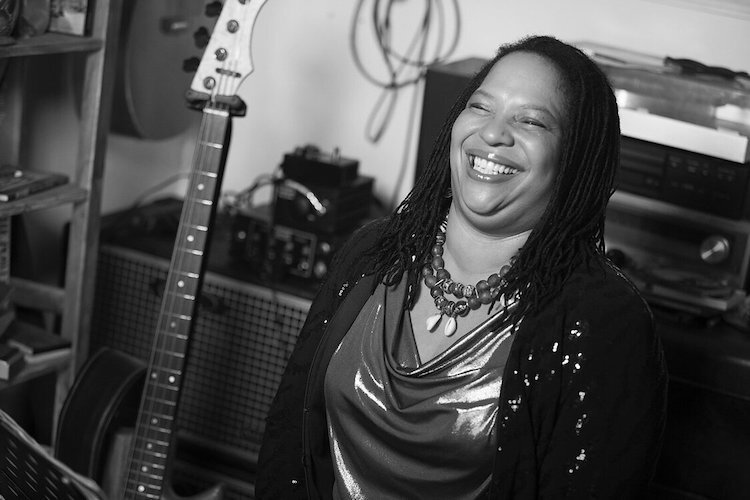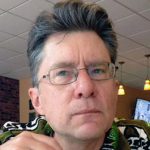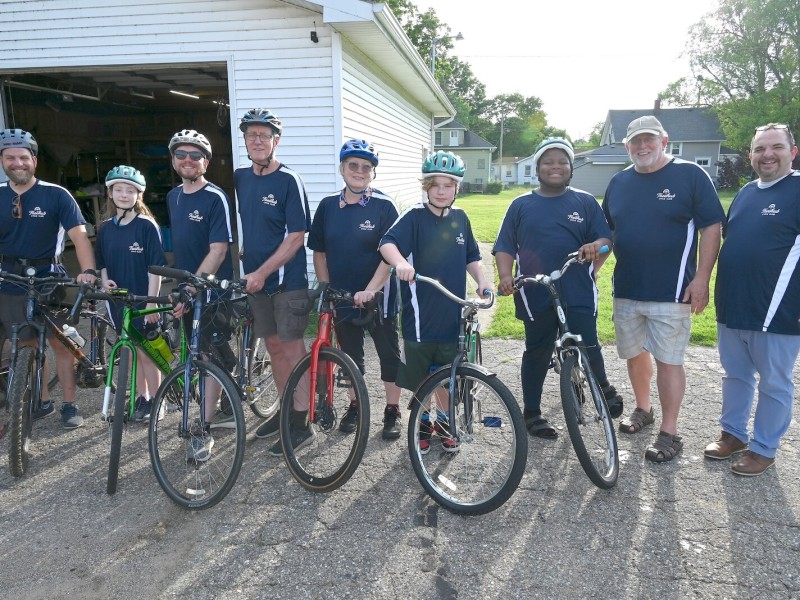There will be music in the streets when the first Edison Jazz Fest gets underway in September
The Edison Jazz Fest will bring national and local jazz luminaries to Kalamazoo to perform in the neighborhood Sept. 12-18. The Dormouse Theatre, Jerico, La Luna Recording, and The Creamery's rooftop garden will be the venues.
In 2019, Peter Formanek was at experimental performance space The Stone in NYC’s Greenwich Village when he got hooked on the bop and blues of 1950s jazz pianist Herbie Nichols.
Vocalist Fay Victor had assembled a group to perform as Herbie Nichols SUNG, a project literally giving voice to Nichols’ work.
Somehow, some way, it all evolved to bring live jazz to the Edison neighborhood, jazz that would ordinarily be heard in big urban cultural centers like New York City. As Victor, during SUNG, sings in a mantra, “Life is funny that way.”
The Edison Jazz Fest will bring national and local jazz luminaries to perform in the neighborhood Sept. 12-18.
Fest events will be free, “which is awesome,” Victor says from her home in New York City.
Usually, events like this happen at Western Michigan University, or Kalamazoo College, or downtown Kalamazoo venues. And they usually require pricy tickets.
Edison is a dense, lower-income neighborhood with a mix of people that includes around 33% Black residents. Hearing that, Victor says, “In my mind, jazz is a uniquely black music, so it feels right,” to hold the festival there.
It would be rare to get a group like hers out to jazz venues of Chicago or Detroit, Formanek says. Victor and her backing players are “very, very indispensable in the New York creative music and jazz scenes. To have them out here is pretty amazing.”
The fest started as “a vague idea,” he says, to stage a concert of the music of Nichols, most well known for composing “The Lady Sings The Blues.”
Formanek knew he wanted SUNG at this event, wherever it may be. “Fay was immediately responsive generous and open” from the start, he says.
The saxophonist son of bassist Michael Formanek grew up near Baltimore, Md., and came to Michigan to attend the University of Michigan’s jazz program. Since graduating in 2017, he lived in Ypsilanti before moving to Kalamazoo in 2020. He’s done a variety of performances around the Midwest, recently formed a trio, and has been giving private music lessons. He’s also recorded a duet album with his Dad, titled “DYADS.”
He formulated his Nichols tribute idea with jazz pianist Josh Harlow. It grew from the two performing Nichols’ music themselves into a full festival. They wanted it to be grant-funded, free, “and we wanted to bring it to where people lived. And not necessarily have to go downtown and pay $50.”
With the new Kalamazoo-based John Stites Jazz Award grant, they were ready. The Edison Neighborhood Association got on board and helped raise additional funds. The Dormouse Theatre, Jerico, La Luna Recording, and The Creamery’s rooftop garden will be the venues.
Harlow had to leave the project to pursue his career in Chicago; now WMU jazz vocals student Lily Alter is associate director.
The mission remains the same. “We want this to be available to people. Not just this music, but live music in general, in a place like Edison where there really isn’t a whole lot going on,” he says.
For the last day of the festival, they’ll take it into the neighborhood with a parade and block party on Egleston.
All local musicians, “anybody who plays,” can join the parade, he says. “You’re going to hear whatever,” and that’s OK. But he’s thinking of New Orleans-style street parade music, and he might lead with a bit of “When the Saints Go Marching In.”
Edison Jazz Fest Highlights
Fay Victor’s Herbie Nichols SUNG, Dormouse Theatre, Sept. 17.
The New York Times call’s Victor’s style “theatrical and extreme without being campy. Expectations about a jazz vocalist’s demeanor — that it can’t be too aggressive, or that if it’s biting it can’t also be warm — don’t mean a thing to her.”
Victor’s vocals, sometimes with lyrics, sometimes wordless like she’s speaking in improvisational tongues, have an energy like she’s trying to grab a listener by the collar and declare, “here we go!”
“Thank you! I appreciate that,” she says when we told her that.
How does she describe her style? “I don’t describe it as a style at all,” Victor says. She’s a “free-song singer. You can take any song, of any genre, and connect it to improvisation…. I call myself more of a sound artist.”
With SUNG — Anthony Coleman, piano; Michael Attias, alto sax; Ratzo Harris, bass; Tom Rainey, drums — she’s sticking with Nichols’ compositions, but adding her own lyrics and flair.
Victor built her career in the Netherlands. “Herbie Nichols is sort of a known entity there.” She first heard him in the tune “House Party Starting” it “Just knocked me out. Amazed by it, I decided I wanted to be good enough to sing it one day because it’s full of chromaticisms.”
She’s never been to Kalamazoo and is excited to perform in Edison. “We’re very very excited that this festival is happening, and that we get to perform Herbie Nichol’s music, and we get to bring his music to a wider audience.”
There might be people in the neighborhood who don’t know what to expect out of a live jazz set. Victor would say to them, “if you love jazz music or love music that’s full of joy, then this is definitely something to check out.”
Deanna Witkowski Trio, Dormouse Theatre, Sept. 16.
“I do jazz in a lot of places where jazz has never been before,” Witkowski says from her home in Pittsburgh, Pa.
One of the pianist’s many styles is sacred jazz. Witkowski has written church music in jazz forms, has a record of jazz hymns, “Makes the Heart to Sing,” and has played to congregations that might not be the typical jazz crowd.
Witkowski will be playing the music of Mary Lou Williams in Edison.
Her latest album is “Force of Nature — Deanna Witkowski Plays Mary Lou Williams.” She is also the author of Williams bio, “Music For the Soul,” winner of the 2022 Jazz Journalists Association Award for Biography/Autobiography of the Year.
Witkowski became fascinated with Williams and her music when she found that Williams also wrote jazz masses.
“Wow! I found someone else who did this, in the ’60s and ’70s,” Witkowski says. “I was also just amazed by the breadth of her music, and the fact that she was always rooted in the blues, and said that blues was the spiritual feeling in the music.”
If others saw spiritual music as for the church and blues for the nightclubs, Williams didn’t. She “didn’t put things in boxes, and she really had an expansiveness to how she viewed blues or bebop or what she called modern music or her own music,” Witkowski says.
Willams would be all for bringing jazz to a neighborhood like Edison. “She said that jazz should be played in schools, on the sidewalk, in church, community centers, in clubs… I feel like it’s continuing her legacy,” Witkowski says.
She notes that Williams also had a connection with Herbie Nichols. Williams performed Nichols’ compositions, and the two had exchanged letters as friends — letters which Witkowski had recently read at the Rutgers University Williams archive. Nichols had written lyrics to a few of her works. “We may actually play a couple of those tunes,” she says.
Roger L. Jones II, Dormouse Theatre, Sept. 18.
Detroit-based pianist Jones grew up in Flint, where his pastor father immersed him in the gospel music of the Greater Holy Temple COGIC. He moved on to jazz, attended Oberlin Conservatory, and went on to perform with names like Wynton Marsalis, Joe Henderson and JJ Johnson.
In Edison he’ll be performing Nichols’ works, backed by live visuals.
Rufus Ferguson, Dormouse Theatre, Sept. 16
Western Michigan University jazz graduate Ferguson went on to perform professionally in the jazz, R&B, and gospel music worlds. He’s now an assistant professor of Jazz and Popular music at Albion College, and Jazz Vocal Accompanist at Kalamazoo College.
In Edison, he’ll be with his trio, which played a COVID-year stream for the Gilmore Piano Festival, 2020.
Other performers and events include: Orchestra Jammbo’laya, a group of young Kalamazoo community musicians; local musicians at The Creamery; WMU Student jazz ensembles and open jam sessions at Jerico, and various workshops with Peter Formanek and Fay Victor. For all the details, see the event calendar here.
Who was Herbie Nichols?
Blue Note calls him “One of jazz’s most tragically overlooked geniuses.” Fay Victor asks, “Why isn’t he as famous as Thelonious Monk?”
Nichols was born in 1919, played bebop in the 1940s but had to play Dixieland to pay his bills. His original compositions made use of Dixieland, swing, West Indian folk, Thelonious Monk-like styles, classical harmonies — Blue Note writes that he “was simply too unclassifiable and complex to make much sense to jazz audiences of the time.”
Mary Lou Williams was the first to play his work. He wrote “Lady Sings the Blues” for Billie Holiday, and recorded albums for Blue Note. It was only after he died from leukemia in 1963 that Nichols grew in prominence in the jazz world.


















